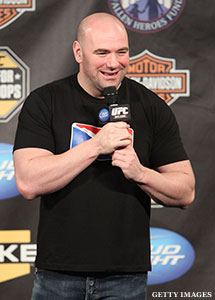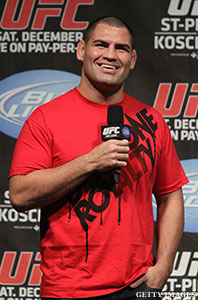
It seemed a slam dunk of a pander.
More than 5,000 fans were on hand at the Bell Centre to witness the weigh-ins on the day before the Ultimate Fighting Championship's April 2008 Montreal debut. The following night, 21,390, then a North American mixed martial arts attendance record, would rock the building.
So UFC president Dana White went for the seemingly easy play to the crowd and donned a Montreal Canadiens jersey for those fans so rabid that they took a trip downtown during Friday rush hour just to watch the fighters strip half-naked and step on a scale.
To White's surprise, he was lustily booed by the crowd when he made his appearance. In Montreal. In the Canadiens' home arena. During the NHL playoffs.
The crowd's reaction to the bleu, blanc et rouge-clad White served as the genesis for what is expected to be the biggest event in UFC history. A crowd of 55,000 will fill Toronto's Rogers Centre for UFC 129 on Saturday night, where one of Canada's most popular athletes, welterweight champion Georges St. Pierre, will defend his title against Jake Shields.
In tracking ticket buys for the 2008 show, company officials found an astounding percentage of ticket buyers trekked in from Ontario, where MMA was at the time outlawed and where they definitely don't like the Canadiens. Internal stats also showed Toronto as one of the company's consistently hottest PPV markets.
The UFC has mastered the art of the 21st-century fight-promotion road show in a way that has left boxing in its dust. The company runs events out of its Las Vegas home base on a predictable holiday schedule, with major shows on New Year's Eve, Super Bowl, Memorial Day and Fourth of July weekends, giving fans a reason to spend a holiday (official or otherwise) weekend. It's just enough to keep the world's fight capital humming without burning out the market.
The rest of the year, the UFC hits the road. If you're a hardcore mixed martial arts fan and don't have the means to trek out to the desert, a UFC visit to your hometown is your personal Super Bowl, something worth shelling out big bucks.
Consistent hot-selling markets are earmarked for regular spots on the calendar. You can all but guarantee the UFC will hit Montreal, Newark, the Los Angeles area and Northern California every year.
But there are only so many shows to go around, which leads to pent-up fan demand, which usually means big bucks the first time the UFC hits town, as was demonstrated with Toronto, where the home of the Blue Jays sold out in an hour.
Over the past four years, the UFC has made a mark from Minneapolis to Memphis, from Montreal to Vancouver, and from London to Sydney. And yet, for various reasons, there are still places, whether major markets or smaller MMA hotbeds, the company has yet to visit. Which leads us to wonder: Which cities are most ready for some cagefighting action? Here is, in our opinion, the Top 10 cities that have yet to see the UFC but most deserve a live event.
Some ground rules before we begin: 1. We're not going to nitpick over city lines. The UFC hasn't technically been to Washington D.C., but it's a short metro ride from our nation's capital to Fairfax, Va., where an Ultimate Fight Night event was once held; 2. We're only including the modern era here, dating to when the UFC's current owners bought the company in 2000. So if you were there in Tulsa when Keith Hackney used groin strikes to defeat Jon Son back at UFC 4, sorry, doesn't count; 3. We're not including Pittsburgh or Rio, which both host their first events this summer; 4. Finally, we're including Zuffa-era World Extreme Cagefighting events, which removes places like the Phoenix metro area. Phoenix, you got to see "the head kick" in person, so you can't claim you haven't seen top-level MMA.
10. Milwaukee: Home of one of America's hottest up-and-coming MMA camps in Duke Roufus' Roufusport Martial Arts Academy -- which boasts UFC standouts Pat Barry, Anthony Pettis, and Alan Belcher, among others, -- Milwaukee is natural choice for a UFC event.
9. Honolulu: Hawaii has a long been an MMA hotbed, as Honolulu was one of the few cities in which the sport thrived while the UFC was on life support in the early 2000s. The UFC's ratings and PPV buys in the market are so strong that the company seriously discussed running Aloha Stadium during Hilo native B.J. Penn's peak. While the costs involved in running a live Hawaii event in this economy makes Honolulu a less likely destination than before, there's no doubt the fan support would be there.
8. Orlando: From Memphis to Atlanta to Tampa/St. Pete, the Southeast boasts some of the most passionate and knowledgeable mixed martial arts fans around. They're a crew that loves a good brawl, but also knows the difference between a Kimura and an Americana. Orlando is the biggest city in the region that has yet to host a UFC event
7 (tie). Remaining major Canadian markets: Based on the evidence, it appears all the UFC has to do to make loonies hand-over-fist is pick a venue, put tickets on sale, and open the doors. After Saturday, Ottawa, Calgary and Quebec City will be the largest remaining Canadian markets the company has yet to hit.

6. Buffalo: A blue-collar town that loves its contact sports ... and all those rabid Ontario fans are just a short drive over the border. When New York state finally gets around to legalizing MMA, expect Buffalo to be No. 2 on the list after the big city.
5. San Jose: A wild card. San Jose has long been one of the hottest MMA cities in the world, as the HP Pavilion was Strikeforce's home base. But it's no secret former Strikeforce owner Silicon Valley Sports and Entertainment, which runs the arena, wants to keep hosting events. With San Jose's American Kickboxing Academy gym serving as the home of elite fighters from UFC heavyweight champ Cain Velasquez (left) to Jon Fitch to Josh Koscheck, an HP Pavilion event is a no-brainer.
4. Paris: The UFC does some of its strongest television ratings in France, where events air on RTL9. Problem is, when France lifted its MMA ban in 2008, it instituted rules that mandate use of a ring instead of a cage and limits strikes on the ground. So until France gets on board with unified MMA rules, Paris will remain on hold.
3. Mexico City: The UFC has long cast its gaze the vast Latino fight market, which remains steadfastly loyal to boxing. But nationally televised WEC events featuring former bantamweight champ Miguel Torres drew monster ratings, and the Mexican-American Velasquez's title win over Brock Lesnar in October was the first UFC event to become headline news among Mexican fans. If the undefeated Velasquez, currently rehabbing a shoulder injury, continues winning, he seems a natural to headline a debut South of the border event.
2. Tokyo: This one is easier said than done. When the UFC purchased Japanese rival PRIDE in 2007, which was the biggest MMA company in the world for many years, it had an eye on running overseas events. But the barriers for entry proved to be too great at the time, so the company ended up retaining the company's assets (mainly fighter contracts and the video library) and never ran another PRIDE event before folding the company. Still, for UFC to become the truly global brand it endeavors to be, a Tokyo show is a must at some point.
1. New York City: The UFC has taken the adage "if you can make it here, you can make it anywhere" and stood it on its head. With New York state the last major holdout to MMA regulation, the company has instead gone just about everywhere else. So they've proven they can make it anywhere. This leaves New York City and Madison Square Garden as the cherry on top. Despite a multimillion-dollar lobbying effort, the intractable positions of a few head-up-their-backsides politicians are making MMA legalization in New York a protracted battle. Until then, big fights -- and the millions of dollars in economic impact that go with it will continue seeping across the river to New Jersey.
-- Dave Doyle is the MMA/boxing editor for Yahoo! Sports.




